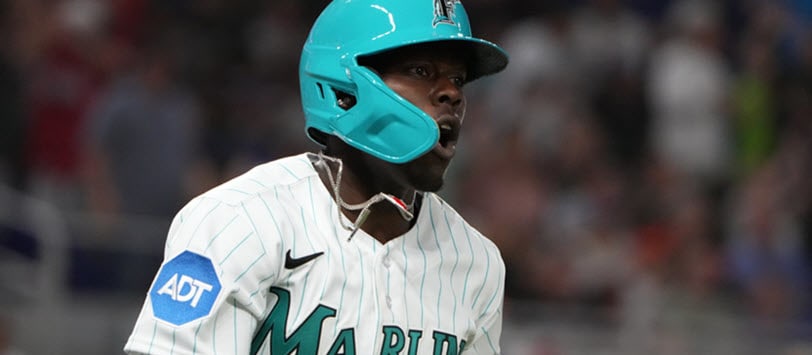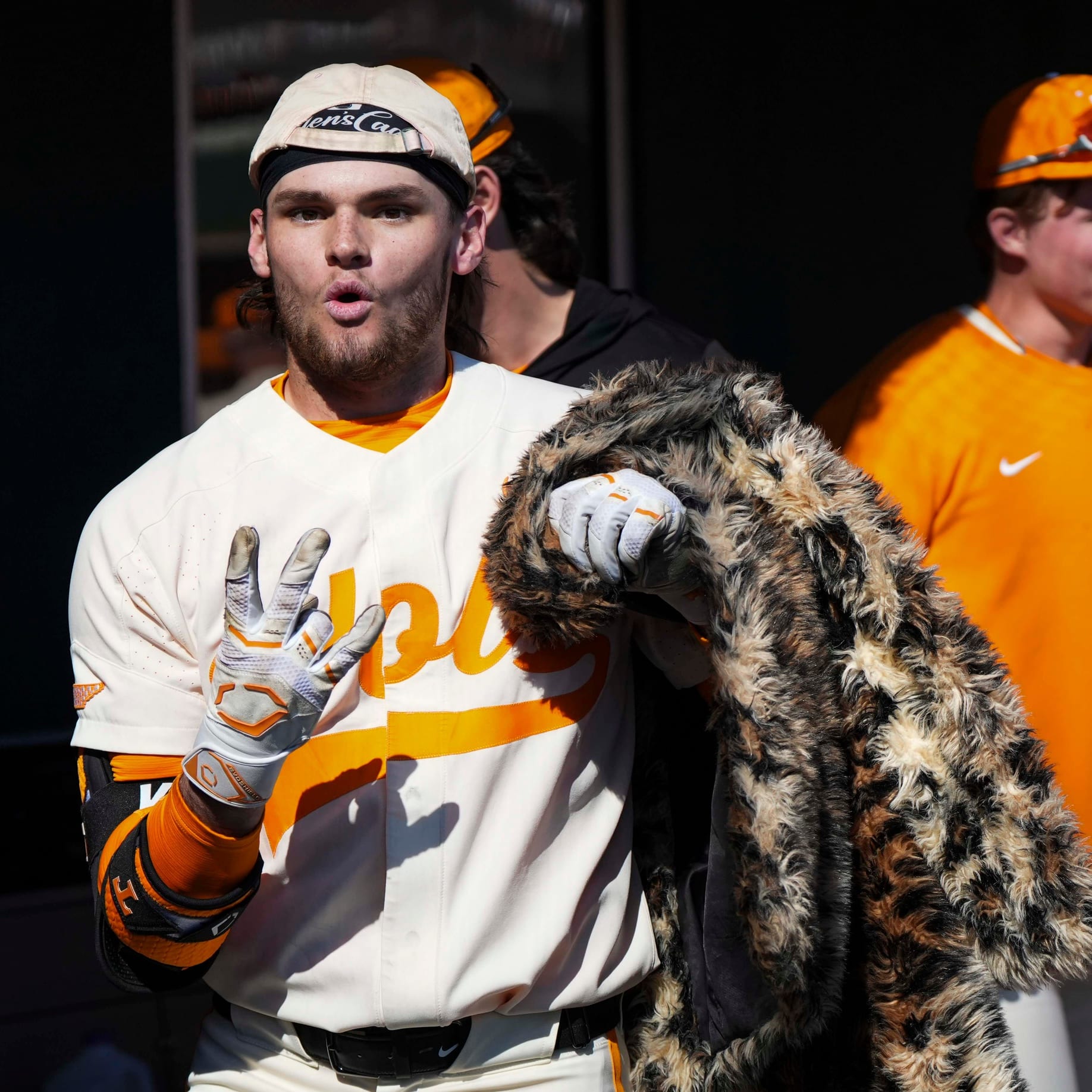This article is part of our Fantasy Baseball Injury Report series.
The Marlins center fielder did not play Sunday after suffering a toe injury following a collision with the outfield wall. The team is calling the injury turf toe, a common ailment that effects the big toe.
Turf toe often occurs when the big toe is forced into hyperextension, spraining a joint known as the metatarsophalangeal (MTP) joint. It gets its name as the motion often occurred on the unyielding AstroTurf used in prior decades. Like any other sprain, turf toe can occur in varying degrees with the mildest case limited to damage to the ligament and associated joint capsule. However, in more severe cases, the injury can involve the tiny bones at the base of the big toe known as the sesamoids. These bones can break or the tendon that houses these bones can be strained.
Unfortunately, turf toe is often a nagging injury and can take a considerable amount of time to heal. A conservative (non-operative) approach to treatment is often utilized initially. This involves anti-inflammatory medication and modalities utilized to address any other associated symptoms. The footwear of the injured athlete can be modified to protect the area as the individual returns to activity, and there are tape jobs that can be used for additional support. Even then, the injury is susceptible to re-injury or aggravation.
Chisholm is slated to meet with a specialist, but a trip to the injured list seems like the most likely scenario. Furthermore, a dip in productivity should be expected, even if
The Marlins center fielder did not play Sunday after suffering a toe injury following a collision with the outfield wall. The team is calling the injury turf toe, a common ailment that effects the big toe.
Turf toe often occurs when the big toe is forced into hyperextension, spraining a joint known as the metatarsophalangeal (MTP) joint. It gets its name as the motion often occurred on the unyielding AstroTurf used in prior decades. Like any other sprain, turf toe can occur in varying degrees with the mildest case limited to damage to the ligament and associated joint capsule. However, in more severe cases, the injury can involve the tiny bones at the base of the big toe known as the sesamoids. These bones can break or the tendon that houses these bones can be strained.
Unfortunately, turf toe is often a nagging injury and can take a considerable amount of time to heal. A conservative (non-operative) approach to treatment is often utilized initially. This involves anti-inflammatory medication and modalities utilized to address any other associated symptoms. The footwear of the injured athlete can be modified to protect the area as the individual returns to activity, and there are tape jobs that can be used for additional support. Even then, the injury is susceptible to re-injury or aggravation.
Chisholm is slated to meet with a specialist, but a trip to the injured list seems like the most likely scenario. Furthermore, a dip in productivity should be expected, even if his stay on the IL is brief. He will carry an elevated level of injury risk for the foreseeable future. Garrett Hampson replaced Chisholm on Sunday and could be a decent short-term option for those looking for at-bats.
The Marlins are also managing injuries in the bullpen as Miami placed their closer on the IL with left elbow nerve irritation. For pitchers, this injury designation usually involves the ulnar nerve. The ulnar nerve (better known as the "funny bone") runs the length of the arm and provides motor innervation for the muscles of the forearm and hand. It also relays sensory information from the same area, particularly the pinkie and ring finger. The nerve is often compressed at the elbow, resulting in a condition known as cubital tunnel syndrome. Treatment involves addressing the associated symptoms while identifying and treating the root of the problem. Unfortunately, nerve tissue can be slow to improve, and it would not be surprising to see Puk miss more than the allotted time. Dylan Floro and Tanner Scott should see a bump in usage and an increase in potential save opportunities.
Check Swings
C.J. Cron: Back spasms are expected to send Cron to the IL after the problem forced him from Sunday's game. The quick designation means the spasms are likely linked to a true injury, most likely a lower back strain. A more definitive timeline should be provided following additional testing on the area. Mike Moustakas and Harold Castro seems like the most likely to benefit from Cron's absence.
Yandy Diaz: Apparently, the only thing that can slow Diaz's red-hot start to the season is injury. Diaz was removed from Sunday's game with pain and tightness in his left groin and is now slated to undergo an MRI. Tampa has a scheduled off day Monday, and an update should be provided soon. He should be considered day-to-day for now, but those invested in Diaz should begin to consider fill-in options should he require a trip to the IL.
Kyle Hendricks: The Cubs right-hander continues to work his way through his rehab assignment. Hendricks, out since suffering a capsule strain in his shoulder last season, has made four outings with three different minor league teams, including back-to-back starts with Triple-A Toledo. He went 5.0 innings in each outing, surrendering a combined two runs. Chicago could welcome him back later this week, likely at some point during their three-game series in Philadelphia. He will likely be under a strict innings cap for the immediate future, limiting his initial fantasy value.
Nick Lodolo: The Reds left-hander will miss time after being diagnosed with calf tendinosis. The wording here is key to understanding Lodolo's short and long-term health. Tendinosis is different from tendinitis. Tendinitis is an acute injury that occurs when a tendon becomes inflamed. The condition is often manageable with various forms of treatment, and players often learn to play with the problem. Tendinosis is a chronic, over-use injury and is considered more significant. Tendinosis occurs when the involved tendon has accrued damage and inadequately heals. The condition is often very painful, and the damage leaves the tendon weak and functionally limited. As a result, tendinosis often requires a considerably longer recovery time. As a result, Lodolo could be staring at a longer than anticipated absence and will remain a risky investment upon his return.
Anthony Rendon: Rendon is likely headed to the IL with a groin injury. The ailment is currently being called groin tightness, but an IL stint suggests it is likely more of a strain. Hopefully the strain is a mild, low-grade injury and Rendon will be able to return when first eligible. Gio Urshela will take over at the hot corner with Rendon out.
Corey Seager: The Rangers are set to welcome back Seager soon, perhaps as early as Monday. Seager has missed the last month of the season after suffering a hamstring strain on April 11. He has appeared in three games with Double-A Frisco and has not reported any sort of setback. Ezequiel Duran has played well in Seager's place and could stick around as a utility player, especially if Seager needs routine days off as Texas eases him back into an everyday role.
Mike Trout: The Angels outfielder did not start Sunday after getting hit by a pitch on Saturday. The ball struck Trout on his left elbow, but it appears he avoided a serious injury. Fortunately, he was able to pinch hit Sunday and could be back in the lineup as soon as Monday. Consider him day-to-day.










